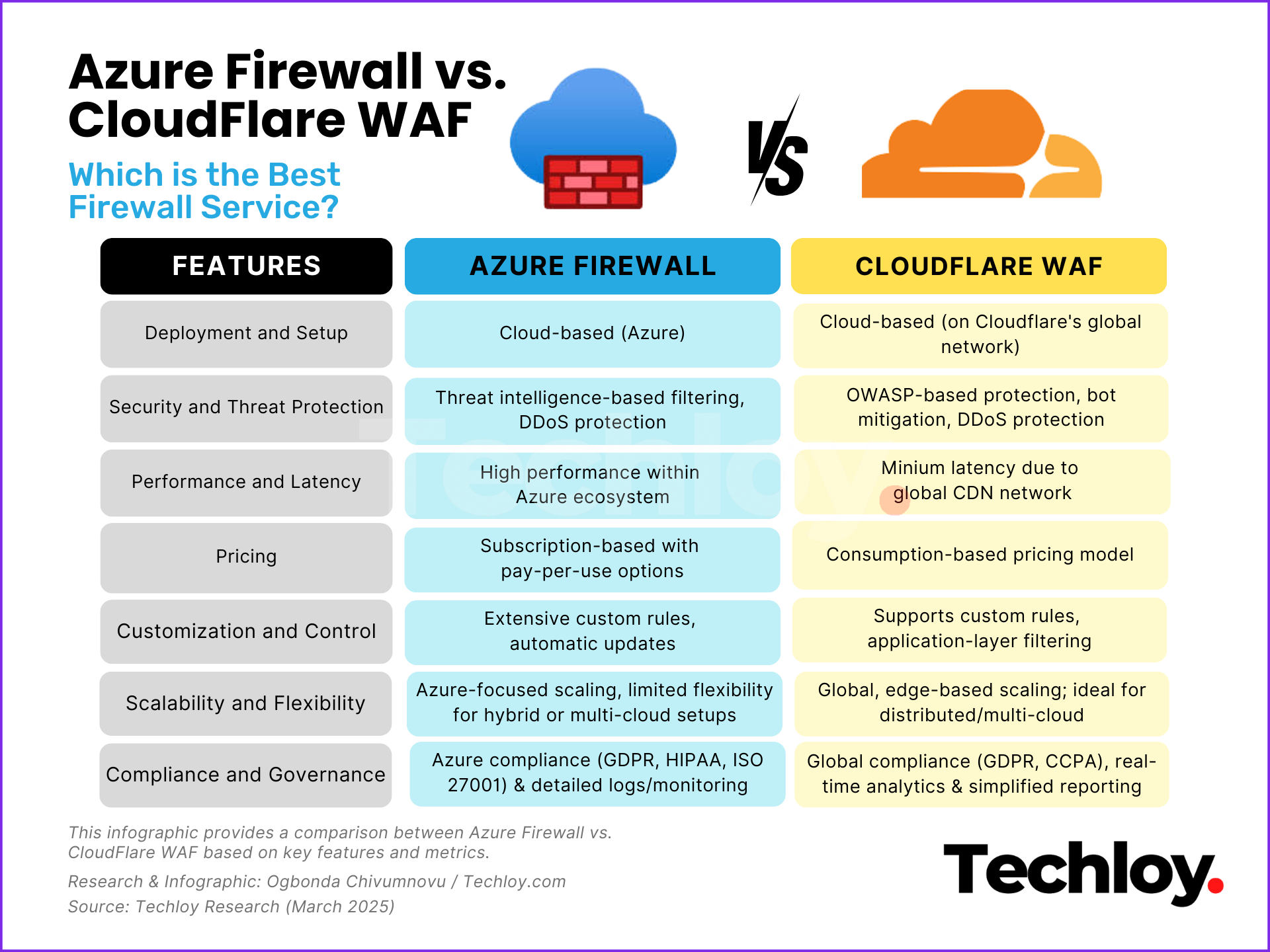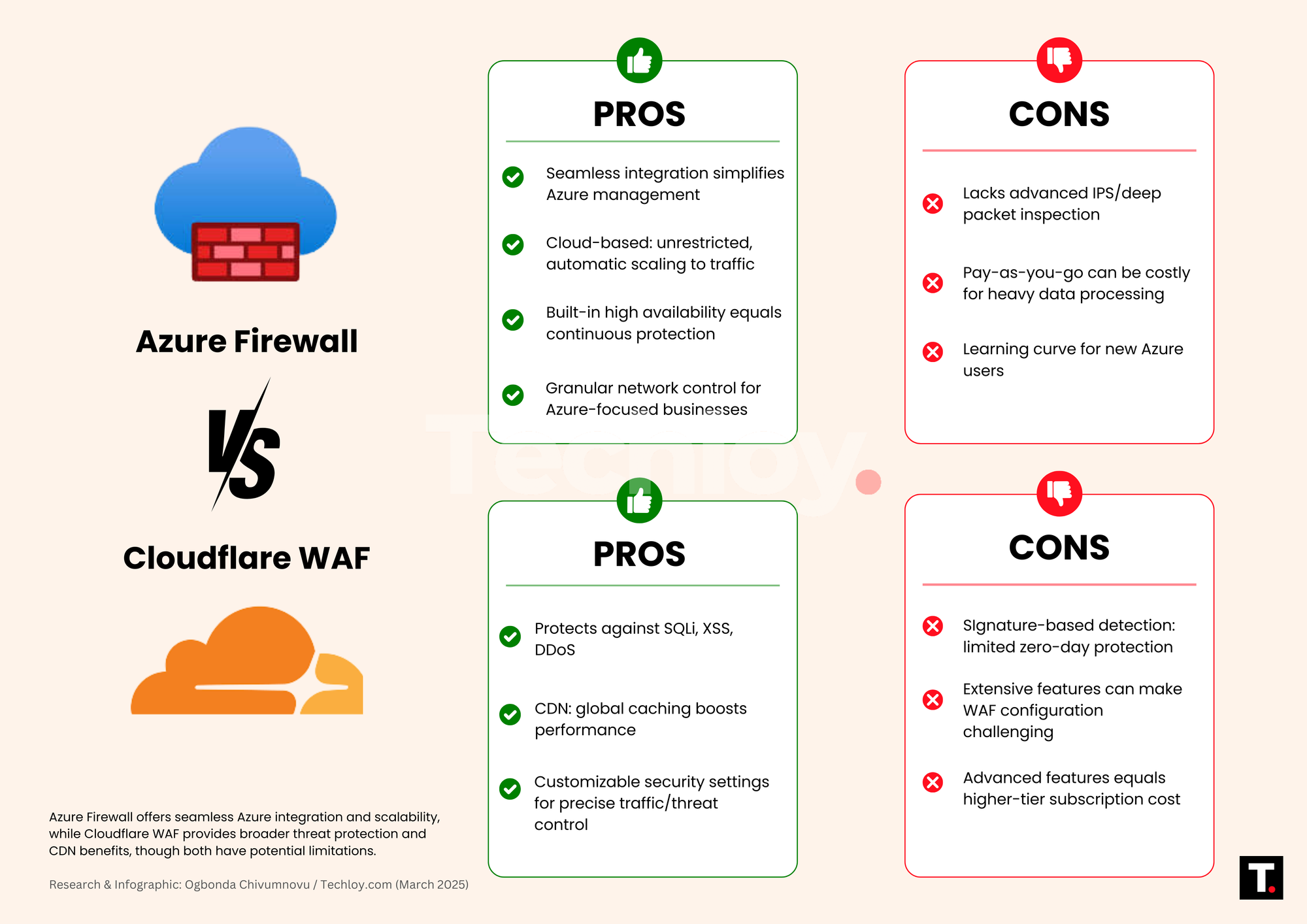Azure Firewall vs. CloudFlare WAF: Which Is The Best Firewall Service?
Understanding the differences between Azure Firewall and Cloudflare WAF helps businesses choose the most effective firewall.

Your company’s network is under siege. Suspicious traffic is pouring in, security alerts are firing off, and your current firewall is struggling to keep up. It’s clear you need an upgrade, but now you’re stuck choosing between two of the biggest names in the game: Azure Firewall and Cloudflare WAF.
Azure Firewall is Microsoft’s fully managed, cloud-based security service designed to protect resources within the Azure environment. It acts as a stateful firewall, monitoring and controlling both incoming and outgoing traffic from the network layer (Layer 3) to the application layer (Layer 7) using security policies. One big perk is its deep integration with Microsoft's security tools, allowing it to automatically block traffic from known malicious IPs and domains, boosting real-time protection. Since it's built for Azure, it scales with your traffic needs—though that means higher usage could lead to higher costs. It’s a strong choice for businesses heavily invested in Azure that need detailed, network-level security.

Conversely, Cloudflare WAF is a cloud-based web application firewall that protects websites and apps no matter where they’re hosted—no extra hardware or software needed. It sits on Cloudflare’s massive global network, analyzing traffic at the network edge to block threats and boost performance. Known for its strong DDoS protection, Cloudflare WAF handles large-scale attacks with ease. It also includes advanced bot management and API security, using real-time threat data from its global network to stay ahead of new attack patterns. It’s a solid choice for businesses needing scalable, straightforward web protection, especially those with a global audience.
Azure Firewall promises seamless integration with Microsoft’s ecosystem and deep network control, while Cloudflare WAF is known for its powerful global network and rapid threat mitigation. Both sound like solid options, but which one is the better fit for your business?
This article will guide you in your search for this answer.
1/ Deployment and Setup
Azure Firewall is built into the Azure platform, making it easy to deploy for businesses already using Azure services. It can be set up directly from the Azure portal with minimal configuration. It also supports both stateful and stateless firewalling.
Cloudflare Web Application Firewall is a fully cloud-based solution that does not necessitate any hardware or software installation. Onboarding is facilitated through the Cloudflare dashboard. Furthermore, it protects websites and APIs at the edge of Cloudflare’s global network.
Which wins? Cloudflare wins this because it is a faster and simpler setup without needing deep platform integration.
2/ Security and Threat Protection
Azure Firewall serves as a network security solution for Azure Virtual Networks and workloads. Functioning as a secure intermediary between Azure resources and the internet, it inspects traffic at layers 3-7. Key attributes include its cloud-native design, stateful inspection, integration with Azure threat intelligence, centralized policy management, high availability, and scalability. It is best suited for organizations with substantial Azure deployments requiring robust network protection.
In contrast, Cloudflare WAF prioritizes web application security, acting as a barrier to online threats by analyzing and filtering malicious traffic. Key features include its global network for DDoS and CDN, DDoS protection, bot management, API security, and real-time analytics. It is ideally suited for organizations prioritizing robust web application protection and global reach.
Which wins? Cloudflare slightly wins because it does better for web application security, while Azure Firewall is ideal for protecting Azure network resources.

3/ Performance and Latency
Azure Firewall is optimized for managing traffic within the Microsoft Azure ecosystem. Its performance scaling is directly linked to its consumption model, wherein higher traffic volumes incur increased costs.
On the other hand, Cloudflare WAF leverages Cloudflare's extensive global Content Delivery Network to effectively minimize latency. By operating at the edge of the network, it provides near real-time protection against threats.
Which wins? For overall performance and latency, Cloudflare WAF typically has the edge over Azure Firewall, particularly for web applications. This is largely thanks to its global CDN infrastructure and highly optimized WAF processing capabilities.
4/ Pricing
Azure Firewall operates on a pay-as-you-go model, primarily based on data processing volume. While this allows for flexibility, organizations with substantial online presence may incur higher costs due to the necessity of implementing extensive web Access Control Lists (ACLs) and rules to achieve their desired security level. For instance, pricing for a medium-sized gateway is $0.126 per gateway-hour, and for a large gateway, it is $0.448 per gateway-hour.
For Cloudflare, it offers various pricing options that cater to distinct feature sets and service levels. This tiered approach allows organizations to choose a plan that aligns with their specific security needs and budget constraints. For example, Cloudflare's business plan costs $200 per month, while the Enterprise plan requires a custom quote. Additionally, the Pro plan package includes enhanced security with WAF and DDoS alerts for $20 a month.
Which wins? Cloudflare WAF, with its fixed pricing, makes budgeting easier, and its entry point is more affordable.
5/ Customization and Control
Azure Firewall offers extensive rule configuration capabilities, encompassing both network and application-layer filtering. Furthermore, it supports the integration of custom threat intelligence feeds. Users can configure Network Address Translation (NAT) rules, network rules, and application rules as required.
Cloudflare WAF provides managed rule sets that are based on Cloudflare's comprehensive global threat data. This service is highly customizable and benefits from automatic updates. Additionally, it features built-in support for Zero Trust security models and API security measures.
Which wins? Azure Firewall offers more detailed and granular control over network-level security.
6/ Scalability and Flexibility
Azure Firewall scales seamlessly within the Microsoft Azure ecosystem, making it ideal for businesses with growing Azure workloads. However, its scalability is tied to Azure’s infrastructure, which may limit flexibility for hybrid or multi-cloud environments.
On the other hand, Cloudflare WAF leverages its global network to handle traffic spikes and distributed workloads. Its edge-based architecture ensures consistent performance and flexibility across diverse environments, including multi-cloud setups.
Which wins? Cloudflare WAF wins for its global scalability and flexibility, especially for businesses with distributed or multi-cloud architectures.
7/ Compliance and Governance
Azure Firewall integrates well with Azure’s compliance frameworks, making it easier for businesses to meet regulatory requirements like GDPR, HIPAA, and ISO 27001. It also provides detailed logging and monitoring tools for audit purposes.
Meanwhile, Cloudflare WAF offers robust compliance features, including DDoS protection, bot management, and data encryption, which help meet global standards like GDPR and CCPA. Its real-time analytics and logging simplify compliance reporting.
Which wins? It’s a tie. Azure Firewall excels for Azure-centric compliance needs, while Cloudflare WAF is better for global compliance and web application-specific regulations.

Which is the Best Firewall Service?
Azure Firewall is ideally suited for organizations with significant investments in the Azure ecosystem that require network-level security with granular control over traffic. Furthermore, it represents a logical choice for businesses operating with an Azure-based infrastructure.
On the other hand, Cloudflare WAF excels in safeguarding web applications through real-time threat detection and mitigation operating at the network edge. It stands as a highly recommended option for those seeking a web security solution characterized by its speed, scalability, and ease of configuration.






